To begin our blog of our trip to Burma, our decision to go there was based on some conditions we set ourselves. We decided to go there only as responsible travellers not package tourists. We intended to stay in small family run guest houses only and use transport that is run by private companies or individuals. We would not stay in government run hotels or use the train network or airlines, also run by the government. We would try our best to spread our money over as many local businesses as we could rather than to keep returning to the same shop over again. We decided to go to Burma to meet the people, talk about their lives and answer any questions they have for us, but only talk about political issues if they brought the subject up and it felt safe to do so, as we did not want to get anyone into trouble. Any sightseeing we would do is secondary to this and is done to support the people or as a way to meet them.
It's not possible to summarise the history and politics of Burma, it's complicated and better to read the background of the country for yourself if you are interested, especially the last 20 years. But here's a brief overview to give an idea what kind of country we are heading to. It is run by an oppressive military regime. They only take from the people and give nothing in return. Burma is a rich country, it has natural gas supplies, teak and gems galore, but the people of the country are poor. The government keeps all the money and resources for itself. They do not recognise election results, instead they put the leader of the winning party, Aung San Suu Kyi, under house arrest for nearly 20 years and imprison key members of the party. Anyone showing dissent towards the government are sent to prison, tortured or just disappear. The people have no freedom of speech, no right to protest, no human rights. They live in a 1984 society where they are watched or afraid spies will be listening to their conversations. This is not going to be easy...
What's with the name - Burma or Myanmar? The government changed the name to Myanmar 20 years ago, although there was no referendum with the people to decide this and the name change is not recognised internationally. Myanmar is an old name for the country, originating from the Myanma people who arrived from Mongolia in the 15th century, you can tell I have read a history book on this can't you! Burma is the name given by the British when they arrived in 19th century. We weren't sure which name we should be using so we asked a few people. Everyone said Burma. The only reason the Burmese call the country Myanmar is because they will end up in prison if they say Burma.
Day 1 - Yangon
So we arrived safely in Burma after some hesitation about getting on the plane in Bangkok because of last minute doubts as to whether we were doing the right thing by going. We've read that arriving at Yangon airport can be tense because immigration can question you in depth about your intended stay and customs search your bags for any electronic equipment and they have been known to confiscate computers until you leave the country. We were surprised to experience none of this. The immigration officers were polite and although using an outdated passport system where they had to type all our details in by hand, no questions were asked. Customs? We were all prepared to walk through the red zone to declare our laptop but there was no one there and at the green zone they just waved us through, not a hint of concern as to what we were bringing into the country.
We had booked a hotel room ahead of arriving and they kindly picked us up for free. The airport is about 30 minutes from downtown Yangon (new name for Rangoon), so we saw a few of the sights on the way in including a police barricade at the entrance to University Avenue, where Aung San Suu Kyi is under house arrest. We also had our first anti-government talk with the hotel owner, as he hoped we were going to be avoiding government transport and hotels during our stay. When we arrived at the hotel we had to check in using both our passports, instead of just the usual one, so the authorities can keep a track of where we are in the country at all times and the hotel has to report to the police station each day to say exactly who is staying at their hotel.
As we arrived quite late we didn't venture far from the hotel, but had dinner at a beer station down the road, fried rice, typical Asian cuisine, but with a Burmese flavour to it!
Day 2 - Yangon
We decided to spend our first day in Yangon checking out the downtown area and getting a feel for the city. Our hotel was a 20 minute walk into the main part of town and we passed lots of Tea Shops, where locals drink tea and eat pastries and chapatis. We also passed a number of run down buildings with barbed wire fencing, buildings that may have been quite grand at one time but have not been looked after at all. The typical housing in Yangon is 7 or 8 story apartment buildings that don't look too inviting. All the cars are at least 30 years old here, it makes you feel like you've travelled back in time.


It didn't take long before we met our first guide of our trip, a local from Yangon who runs a tour business in town. We wont mention his name just to be safe. He was very happy to see us because tourism has been really low in the last two years since the protests of 2007 and since Cyclone Nargis hit in 2008. His first questions for us were regarding the situation in Bangkok. He was very concerned to hear about the riots because any fall in tourism to Thailand directly effects the tourist numbers in Burma, because most people travel via Bangkok to get here. We were on our way to see the Sule Paya, a 2000 year old gold temple that has been surrounded by shops and turned into a roundabout, so he offered to show us the way.

Our guide then said he would show us some sights of the city and we ended up spending all day with him until 7pm, on the condition he could practice his English on us, which was perfect anyway. He kindly showed us where the British Embassy was, just incase we needed it! Next door was The Strand hotel, a colonial hotel from when the British ruled the country, similar to Raffles. He took us into the most expensive shop in town, one filled with top clothing, cosmetic and electronic brands, including a $25,000 necklace. The only people who can afford to shop there are government officials. We next went to the Aung San Market, filled with gems and jewellry as well as souvenirs. There was no security at all there, considering that all the gems would be locked away in shops elsewhere. All the walking around was thirsty work so we stopped for a local cola drink!
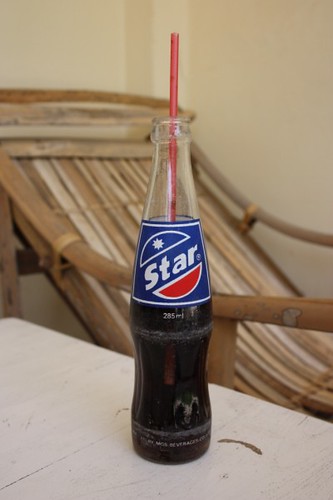
Our guide wanted to show us the 5 star hotels in town to show us how the other half live, so took us on a tour of the Traders Hotel. He also took us to the top of the Sakura tower, where there is a 5 star restaurant with great views of the city and the delta on the opposite side of the Yangon river. He was good at spinning a few tales to get us in, telling doormen we were visitors thinking of staying in the hotel and eating at the restaurant, with us telling them we'll be back for dinner, but of course we had no intention. Next he showed us his office where he works, today was his day off, and then we went to an internet cafe for our first experience with censorship. The government have blocked many websites, but luckily they haven't blocked gmail or the BBC, so we can get email and news here, although it's a very slow connection. We then went to lunch for a taste of Burmese food, consisting of meat curries, soup and tea.
While walking around town we met an old lady called 'Ethel', who was also very pleased to see us and told us she's known as 'Ethel blah blah' as she can talk a lot, which we found out after standing on the street corner for nearly an hour listening to her. She was not afraid to speak her mind and was happy to shout Aung San Suu Kyi out loud, which was shocking as we thought no one mentioned her name allowed or only referred to her as 'The Lady' through fear they would be arrested. She said she knows the corrupt people and they leave her alone as she knows 'tales' about them. She was definitely a character and we promised to visit her another day.
We spent the afternoon at Kandawgyi Lake, just north of downtown, taking a rather dilapidated taxi to get there.
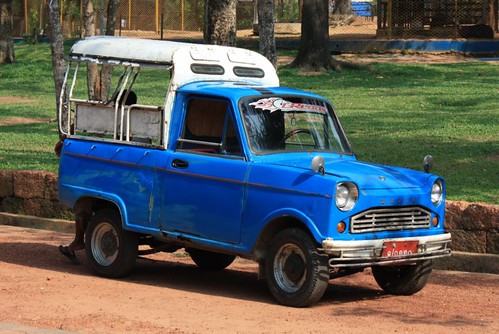
It was here in the open, that our guide started to talk more about politics and his country, so we sat down for a drink and had a long chat with him. He told us stories about when the cyclone hit and how he sent his wife and child to the countryside and stayed to protect their home, which sadly blew away. He now rents a place in a tall building in town as he's too afraid to live in a basic home again. He said there are still many homeless and hungry people in the delta area where the cyclone hit the hardest but the road is blocked for tourists, no one can go and see how bad the situation still is. We also discussed the sanctions on the country and how he believes that China is the key to the country changing, if only they would also sanction the government instead of plying them with trade and money. He still has hope for the future and hopes his son will grow up to have more freedom and be able to get a university education. Our guide studied at university for three years but he was not allowed to finish his course as the government closed the universities down. He would like to move abroad and once tried to get a visa for France with a recommendation letter from a French friend, but he was declined and he lost a lot of money on the application. He thinks even if he was given a visa, he knows he would be stopped at the airport and not allowed to leave the country. I asked him why we had seen no motorbikes or mopeds in town, the lack of them was really noticeable considering this is usually the main form of transport across Asia. The reason is that about 5 years ago a man was drunk on his motorbike and he saw a generals car and decided to drive up alongside it using his fingers to imitate a gun, as if he was going to shoot the general. This frightened the general so much that he demanded all motorbikes be removed from Yangon, so whoever owned a bike had it taken away with no compensation for their loss, how absurd!
The day ended with a fantastic view of the ShweDagon Paya as the sunset over the lake. We had a fantastic day with our guide and a great way to start our trip. He was really intelligent and gave us a great insight into the country and his views. It was so kind of him to spend all day with us and he didn't want any money for his time, we just paid for food and drinks all day.
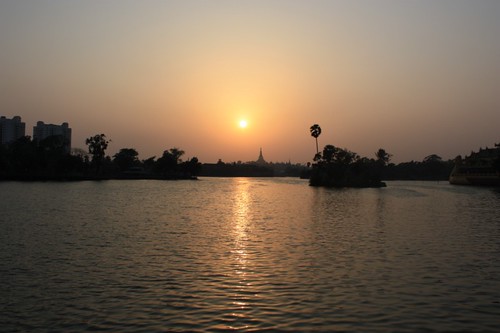
Day 3 - Yangon
The next morning we had breakfast at the hotel and got talking to John, a Scottish man who is married to a Burmese lady. He is in his 70's and visits Burma every year for a month or two and was also a soldier stationed here over 40 years ago, so he knows a lot about the country! He also had some support for the government here, telling us that having a 'strong' government means there is more unity amongst the population because they are able to control the different ethnic groups within the country, who would probably cause civil war if there was a 'weaker' government. He also was not happy with the US and UK sanctions on the country because they cause the people to suffer rather than the generals. The rich can obtain anything they need from China, but the poor people have to live without water and electricity because all their generators are old American or British makes, so they can no longer order parts for them. This means he chooses to stay in a hotel while his wife stays with her family, because they have no sanitation or power when the electricity cuts out, which is very often. He was interesting to talk to as he can see a different side having family living in the country.
Down the road from our hotel was the BoTaTuang Pagoda, where we encountered our first gruff military man who made us pay $2 each to get in. I tried to pay in the local currency Kyat (Chat) but he wasn't happy with that suggestion and wasn't pleased when I said I wasn't going to pay the $5 camera fee, as I could just take a picture from the outside. He ordered us into his office to take off our shoes and no matter how polite I was to him I couldn't get a smile out of him!
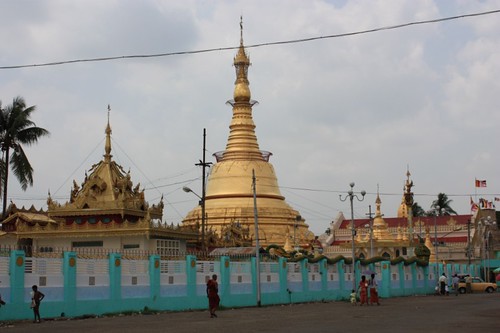
The pagoda is next to the Yangon river, which is wide and brown like many in Asia. There are a few rickety long boat ferries you can take to get to the villages on the other side.
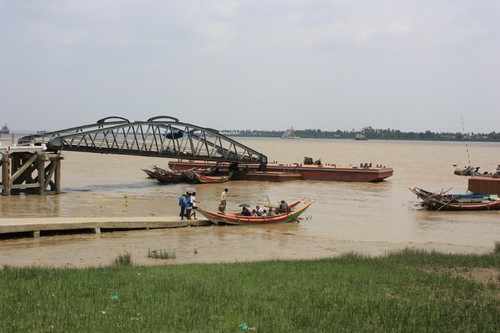
Wandering back into town we met some children who try to sell postcards and souvenirs on the street. They are taught to speak English and ask lots of questions about where you come from and they love to flatter you by saying how beautiful and handsome you are, but we weren't buying. We talked to them for a while to find out about them and when they realised we weren't going to give them money they just chatted normally to us. They were good children so we promised to go see them again the next day.
The main focus point in Yangon for tourism and also for pilgrimage is the Shwedagon Paya, a gleaming gold pagoda that is visible from all over the city. It's the biggest in the country and is 2500 years old. It's the main temple in Burma that every person is expected to visit at least once in their lifetime. We headed over there for 5pm so we could be there for sunset and lights on. It was a fascinating place, like a Buddha city with not just the main pagoda but many temples and shrines all over the area.
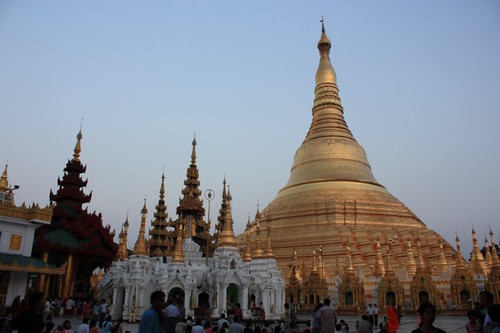
There are many people walking around, praying, talking quietly, and it's very relaxed and peaceful, it doesn't feel busy at all even though it was.
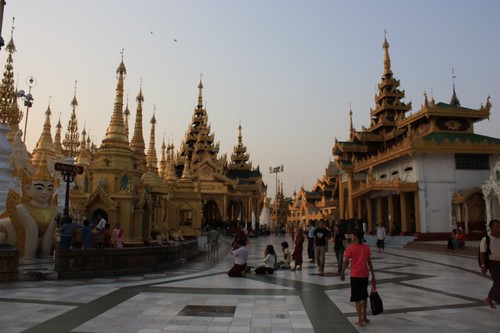
We got a guide to show us around and he started to drop hints that he was against the government, so I asked him a subtle question to make sure. Aung San Suu Kyi made some famous speeches at the Shwedagon twenty years ago, so I asked him where these took place, without mentioning her name. When he realised who I was talking about he became so excited and passionate it was such a change of character from the shy guide who had just been showing us around. He said how much of a hero she is to the people and how they all love and admire her. He told us many stories as we walked whispering to each other trying to pretend he was still guiding us around because if security suspects anyone of 'talking' they can zoom in and listen on conversations. He told us of his brave friend who was sent to prison for writing a letter to his Mother that contained a joke about how peaceful Yangon was after the generals moved to the new capital Naypyidaw. That is all! His friend has since become famous because he can tell all the jokes he likes in Insein (insane!) prison and they make their way onto the streets so people can laugh at the generals expense.
In Buddhism, the day of the week you were born is more important than the actual date and at each pagoda there is a shrine representing each day of the week. People use water to bless the shrine for their day, pouring one cup of water for each year of their life plus one extra for longevity. Aung San Suu Kyi was born on a Tuesday and our guide told us how each Tuesday her followers come to the Shwedagon to pour water on her behalf.
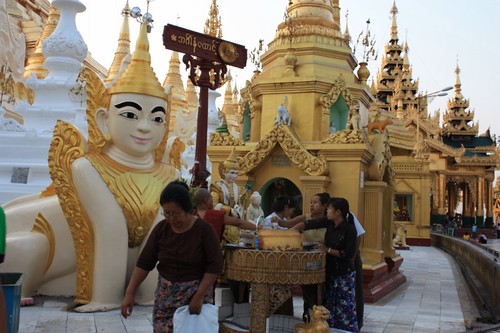
There are often journalists and photographers there trying to spot them
and he knows who a few of them are, but he says they are very brave as
some have been arrested at the pagoda.He also said how they wear a red coloured jacket that represents her,
and one day our guide wore this colour to work without realising and he
was told he could not wear it, for fear he would lose his job!
The most important statement he made was that he really wants people to visit Burma, as he believes people need to see with their own eyes what is happening to the country and the conditions the people have to live in, otherwise there will never be change. He was such a wonderful person to meet and I wish I could spend more time talking to him, but our tour had to end otherwise people would get suspicious of us, but the Shwedagon really was beautiful all lit up.

Day 4 - Yangon
The next day we went back to see the children we met and we bought them a watch each as they told us the day before they would like one. They seemed really pleased to be given a present and they told us more about their daily lives and how the hotel doormen are nasty to them, chase them away and take their postcards off them. I'm sure there are two sides to the story but they seemed glad to have some adults who were on their side for once. As it was our last day in Yangon we promised we would go back to see them when we returned to the city to catch our flight.
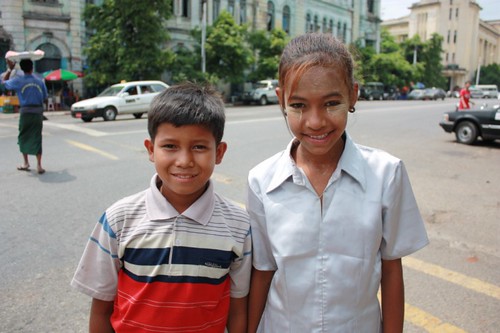
We then sat at a tea shop with 'Ethel', the lady we met two days before, and got a lot of travel advice from her, with her recommending hotels, guides, taxi drivers and rickshaw drivers we should use at every place we planned to visit. She also told us how she can extend visas for most nationalities as she can pay a bribe to the officials on behalf of the tourist, but she can not do the same for US or British citizens because the government are scared of them and don't want them staying in the country any longer than the 4 weeks given on the visa.
We needed to change some money so we went to a camera shop we had been told about, where we could buy some Kyats on the black market. It was all very hush hush with us slipping our dollars under the counter and the lady handing us the wads of 100,000 kyats back again, until we decided to count it in open. She soon grabbed it back off us and used a money counter hidden down low to show it was the correct money. Luckily, they didn't rip us off and we had the correct amount. One guy we met changed $300 on the street and was ripped off $85 even though he checked the money twice, there are a few clever distraction techniques in use. If you go to a bank to change money the official rate is $1 to 9 kyats. The rate at the airport is $1 to 450 kyats. The rate on the street is $1 to 1050 kyats. The only way to beat the corrupt system is to become corrupt yourself and buy on the black market!
In the afternoon we headed over to the highway bus station to catch our 14 hour bus to Mandalay. We passed Inya Lake where you could get a view of the houses on the southern side, one of which houses Aung San Suu Kyi. It's very surreal to know her story of house arrest and to then see where she is kept prisoner, it really brings home how messed up this country is. The bus was in better condition than we expected, an old chinese coach with air con that worked, just!
Jo & Ryan
Photos: http://www.flickr.com/photos/dojo77/sets/72157618486160407/